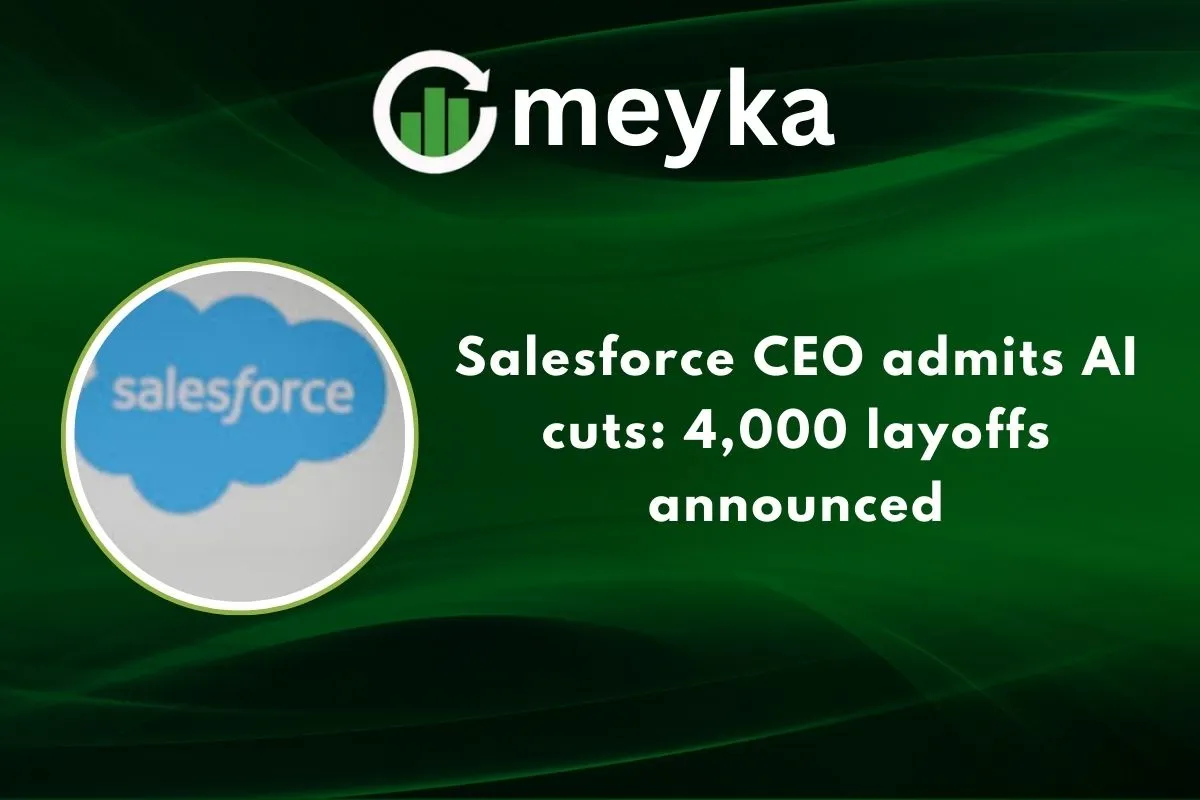Salesforce CEO admits AI cuts: 4,000 layoffs announced
We open on a bold moment. Salesforce has cut 4,000 customer support jobs. The reason? AI systems now manage almost half of customer conversations. Marc Benioff shared that the support staff was reduced from 9,000 to about 5,000 employees. This shift shows how fast AI is changing work. We’ve reached a moment where work and technology come together. This story matters. It’s not just about numbers, it’s about how we work with machines.
Background: Salesforce and AI
Salesforce leads the world in CRM and cloud tools. Since 2022, it has been the top enterprise-apps firm and part of the Dow Jones Industrial Average.
In 2024, Salesforce launched Agentforce, its AI platform that builds autonomous agents for support, sales, and marketing.
By mid-2025, Marc Benioff disclosed that AI was completing 30% to 50% of tasks, including engineering, analytics, and customer support. The systems score 93% accuracy in customer answers.
Just a few months before the layoffs, Benioff said AI would augment, not replace, human workers. He highlighted the importance of keeping people at the heart of operations.
The Layoffs Announcement
In September, Benioff spoke on The Logan Bartlett Show.
He said:
I was able to rebalance my support headcount. I reduced the support staff from 9,000 to around 5,000 since fewer employees were required. The reduction of 4,000 positions equals almost 45% of the support staff.
He mentioned that AI currently manages about half of all customer interactions. Salesforce used AI to stop hiring for replaced roles. It also launched an omnichannel supervisor to manage when AI or human agents should take over.
Why Salesforce Is Cutting Jobs
Salesforce needed fewer people because AI has gotten better and faster. Agentforce helped the company handle 1.5 million customer conversations, with satisfaction scores equal to humans. Salesforce also faced an old problem: 100 million uncalled sales leads from 26 years. Now, AI calls them back. Benioff shared that the past eight months of change were among the most exciting in his career.
AI boosts efficiency, slashes support costs (by roughly 17%), and frees employees for higher-value work. Still, this turn marks a shift, from AI as a helper to AI replacing manual tasks. It shows how fast efficiency and innovation can reshape jobs.
Impact on Employees
We think about the people. Four thousand folks lost support roles. That hit families and futures. Even with severance, they face doubt and stress. At the same time, many employees are being reassigned inside Salesforce. That helps keep the team together. Jobs that remain may need new skills, like working with AI systems. Workers could shift to oversight, fixing AI mistakes, or higher-level customer issues.
Still, worries persist. We wonder if AI will push out more roles. Skeptics also question how well AI handles edge cases or personal customer needs. Yet, Benioff insists jobs are being transformed, not erased. He points to Salesforce hiring in sales roles to support AI deployment.
Looking Ahead: AI and the Future of Jobs
Salesforce is not alone in this move toward AI. Across tech, automation is real. Mark Zuckerberg and others are planning leaner teams.
Benioff sees AI as a chance. He calls it a “digital labor revolution.” AI could add $3 trillion to $12 trillion in global productivity.
He also pushes for ethics. He says humans should guide AI, not be sidelined.
To stay relevant, workers may need new skills. Roles like prompt engineer, AI overseer, or lead-human-agent are rising. Companies and governments must invest in reskilling programs. This gives workers tools to adapt.
Long-term, work will look different. Teams may be smaller, but smarter. Less repetitive work. More problem-solving and human touch. If done right, AI can spread benefits, not cut them short.
Conclusion
Salesforce’s recent layoffs show how fast AI is rewriting work. Four thousand customer support roles went away, while AI took over half of those tasks. This isn’t just about lost jobs; it’s about a shift toward efficiency and transformation. The future calls for a balance between progress and human care. As Salesforce moves forward, we all must ask: how do we let technology serve everyone, not push people aside?
FAQS:
Some jobs at Salesforce are being replaced by AI, especially support roles. But not all jobs will go. Many new roles need people to manage AI.
The Salesforce layoffs are largely the result of AI adoption. AI tools now handle customer chats faster and cheaper, so the company needs fewer support workers than before.
Some leave Salesforce because of layoffs caused by AI. Others go for better pay, less pressure, or new career growth. Changing workplace needs also play a role.
Disclaimer:
This content is for informational purposes only and is not financial advice. Always conduct your research.






